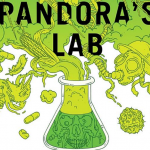heroin
What, with all the attacks on science and scientist these days, we may not want to be focusing on those times when science goes off the rails and makes a huge mess of things. But, science at its best and scientists at their best, will never shy away from such things.
Dr. Paul Offit just wrote a book called Pandora's Lab: Seven Stories of Science Gone Wrong, which not about an evil black dog that escaped from a box, but rather, seven instances when the march of scientific progress headed off a cliff rather than in the desired direction. People died. Many people died. Other bad things…
These days, there’s a lot of attention on finding new and creative ways to turn around the nation’s opioid abuse and overdose problem. And it’s attention that’s very much needed because the problem is only getting worse.
On the first day of 2016, the Centers for Disease Control and Prevention published new data on prescription drug and opioid overdose deaths, reporting that more people died from drug overdoses in the U.S. in 2014 than during any other year on record. In fact, during 2014, there were about one-and-a-half more drug overdose deaths than deaths from traffic crashes, with most of…
Every day in the U.S., more than 40 people die after overdosing on prescription painkillers. Deaths from a more notorious form of opiates — heroin — increased five-fold between 2001 and 2013. Addressing this problem — one that’s often described as a public health crisis — requires action on many fronts, from preventing abuse in the first place to getting those addicted into treatment. But when it comes to overdoses, there’s one answer we know works: naloxone.
Naloxone is a safe prescription medicine that’s highly effective in reversing an otherwise deadly opioid overdose. Typically, emergency…
A few of the recent pieces I've liked:
Tara C. Smith at Slate: Measles is Horrible
Jason Cherkis in the Huffington Post: Dying to Be Free ("There’s A Treatment For Heroin Addiction That Actually Works. Why Aren’t We Using It?")
Sara Ainsworth at RH Reality Check: Lawyers for Fetuses? Yes, It’s Absurd, But It’s Worse Than You Realize
Wil S. Hylton in the New Yorker: A Bug in the System: Why last night's chicken made you sick
Sarah Goodyear at Citylab: More Women Ride Mass Transit Than Men. Shouldn't Transit Agencies Be Catering to Them?
The statistics describing America’s prescription drug abuse epidemic are startling, to say the least. Here are just a few statistics from the Centers for Disease Control and Prevention: In 2009, prescription painkiller abuse was responsible for nearly half a million emergency department visits — a number that doubled in just five years. Of the more than 41,000 drug overdose deaths in the U.S. in 2012, more than half were related to pharmaceuticals. In 2012, U.S. health care providers wrote enough painkiller prescriptions — 259 million — to provide every, single American adult with their own…
The U.S. "war on drugs," besides failing to meet its goals, has demonstrated a stubborn ignorance of the effects that different drugs have in the human body. Granted, some drugs cause degeneration and are properly outlawed. Opiates such as heroin and stimulants such as cocaine and methamphetamine take a harsh physical toll and leave users addicted to the chemical. But classified along with these truly dangerous drugs are some of nature's most mysterious medicines. New research shows how marijuana, psychedelics, MDMA and even ketamine have positive physiological and psychological effects that…
The Associated Press article title "Study: Alcohol more lethal than heroin, cocaine" succeeded in getting me to click through to the article. When I did, I wasn't surprised to learn that the study in question didn't actually find alcohol to be more lethal than heroin. What it concluded was that alcohol is the most harmful drug (out of 20 studied) when harms both to users and to those around them are tallied.
The study -- authored by David J. Nutt, Leslie A. King, and Lawrence D. Phillips and published in The Lancet -- used multicriteria decision analysis modelling to assess the harms caused…
I missed this note on Friday at the Wall Street Journal Health Blog but the National Institute on Drug Abuse (NIDA) has made available some great new curricular resources through their Centers of Excellence for Physician Information Program (NIDA CoEs) (press release)
"Physicians can be the first line of defense against substance abuse and addiction, but they need the resources and the training," said NIDA Director Dr. Nora D. Volkow. "Our long term goal is for doctors to incorporate screening for drug use into routine practice like they currently screen for other diseases; to help patients…
When one thinks of a heroin user, thoughts most often come to mind of a person living in squalor in a big metropolitan city or that of an artsy, poetic hipster (while there are many literary works on the life of heroin users, my all-time favorite is Basketball Diaries, an autobiographical account written by Jim Carroll during the ages of 12 to 15. From this description of Carroll's two works on his life with heroin at the catholicboy.com website of Carroll scholar, Dr Cassie Carter: "After reading about 30 pages of the Diaries, [Jack] Kerouac stated that 'at the age of 13, Jim Carroll writes…

